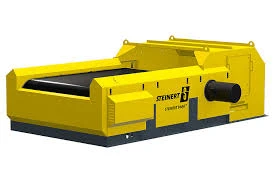

nov . 10, 2024 09:56 Back to list
The Ferrous Shredder An Indispensable Tool for Metal Recycling
In the age of sustainability and environmental consciousness, the recycling industry has taken center stage, particularly in managing ferrous metals—those that contain iron. Among the various advancements in this field, the ferrous shredder stands out as a critical innovation that dramatically enhances the efficiency and effectiveness of metal recycling processes.
Understanding Ferrous Shredders
Ferrous shredders are powerful machines designed to break down large ferrous materials, such as scrap steel, iron, and cast iron, into smaller, more manageable pieces. These machines utilize a series of sharp, rotating blades to shred the metal, allowing for its easy transport and processing. The shredded metal can then be further refined and recycled into new products, thus conserving raw materials and reducing waste.
The Role of Ferrous Shredders in Recycling
The primary purpose of a ferrous shredder is to help businesses and municipalities recycle metal effectively. By breaking down larger scrap metal into smaller fragments, these machines facilitate the sorting and separation processes that are crucial in recycling. The shredded material can be easily sorted for contaminants or non-ferrous metals, making it simpler to extract pure iron and steel for reuse.
In addition, ferrous shredders significantly reduce the volume of metal scrap. With decreasing landfill space and the push for recycling, reducing the physical size of scrap materials is essential. Shredding not only lowers transportation and storage costs but also maximizes the efficiency of subsequent recycling processes.
The Importance of Efficient Design
Modern ferrous shredders are designed with advanced technology that enhances efficiency. Features such as high-capacity motors, durable construction, and automatic feeding systems enable these machines to process large volumes of scrap metal with minimal downtime. Furthermore, innovations like variable speed control allow operators to adjust shredding intensity based on the material type, leading to better outcomes and less wear on the machinery.

Smart technology integration is another key aspect of contemporary ferrous shredders
. By incorporating sensors and automated systems, operators can monitor the performance and maintenance needs of the machines in real-time. This predictive maintenance approach can prevent unexpected breakdowns, thus saving time and costs associated with repairs.Environmental Impact and Sustainability
The significance of ferrous shredders extends beyond operational efficiency; they play a crucial role in environmental conservation. The recycling of ferrous metals reduces the demand for raw materials, which in turn diminishes the ecological footprint associated with mining and refining processes. For instance, recycling steel saves approximately 1,100 kg of iron ore, 630 kg of coal, and 55 kg of limestone for every ton of steel produced from scrap.
Moreover, by facilitating metal recycling, ferrous shredders contribute to the reduction of greenhouse gas emissions. Recycling ferrous metals requires significantly less energy compared to producing metals from virgin resources. This energy savings leads to fewer carbon emissions, further underscoring the importance of shredders in the larger context of climate action.
Challenges and Future Developments
Despite their many benefits, ferrous shredders are not without challenges. The increasing complexity of scrap materials, which often include various contaminants and other metals, can complicate the shredding process. Operators must continually adapt to changes in material composition, requiring ongoing training and investment in technology.
Looking forward, the future of ferrous shredders will likely involve even more advanced technologies, such as artificial intelligence and machine learning algorithms that can improve sorting efficiency beyond market standards. Emerging technologies could also lead to additional sustainability measures, such as energy-efficient designs and the possibility of integrating renewable energy sources into shredding operations.
Conclusion
In summary, ferrous shredders are an essential component of the modern recycling industry. Their ability to process ferrous metals efficiently not only enhances recycling rates but also contributes significantly to environmental sustainability. As technology continues to evolve, the role of ferrous shredders will undoubtedly grow, paving the way for a more circular economy where resources are conserved, waste is minimized, and the planet is protected for future generations. Investing in such innovative machinery is not just an operational decision—it is a commitment to a sustainable future.
Latest news
Troubleshooting Common Eddy Separator Problems
NewsJul.04,2025
The Role of Metal Recycling Plants in Circular Economy
NewsJul.04,2025
The Impact of Recycling Line Pickers on Waste Management Costs
NewsJul.04,2025
Safety Features Every Metal Shredder Should Have
NewsJul.04,2025
How Industrial Shredders Improve Waste Management Systems
NewsJul.04,2025
How Cable Granulators Contribute to Sustainable Recycling
NewsJul.04,2025